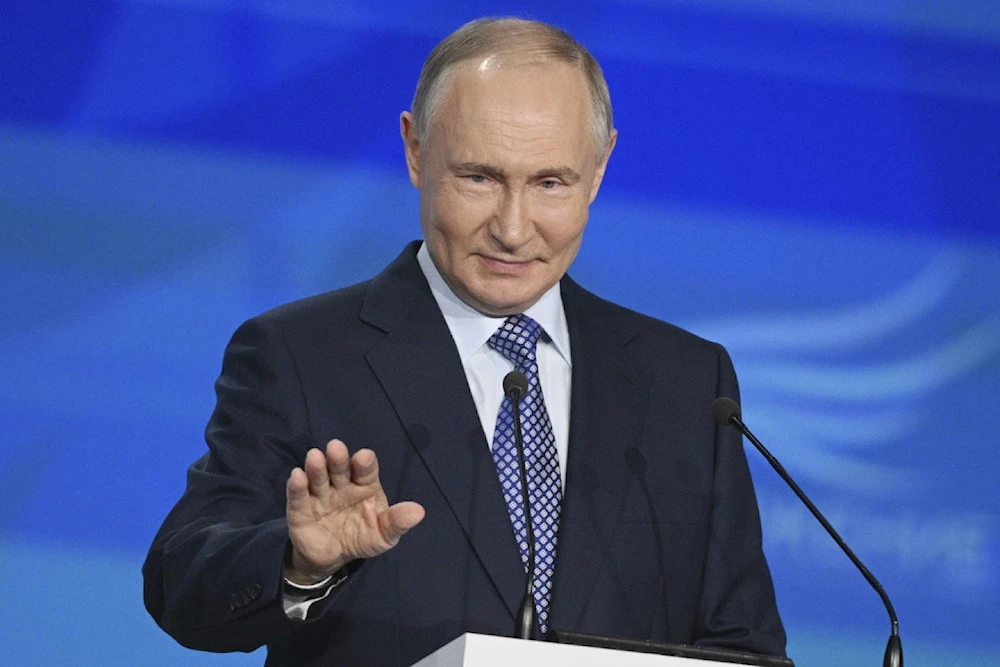Putin announces surprise Ukraine truce for May 8-10
Putin has ordered a three-day ceasefire from May 8-10 for Victory Day, expecting Ukraine to follow suit.
-

Russian President Vladimir Putin gestures while speaking during a ceremony for the Sluzhenie All-Russian Municipal Service Awards at the Russian National Center in Moscow, Russia, April 21, 2025. (Ramil Sitdikov, AP)
Russian President Vladimir Putin has unexpectedly issued an order for a three-day ceasefire to take place from May 8 to May 10, aligning with the annual commemorations of Moscow's World War II Victory Day, as confirmed by the Kremlin on Monday. This surprise move comes just ahead of the significant national observance, which honors the Soviet Union's victory over Nazi Germany in 1945.
Moscow stated that it expected Kiev would issue a comparable order for a ceasefire, emphasizing that it would be fully prepared to respond to any violations that could occur during the proposed pause in hostilities.
"The Russian side is declaring a ceasefire during the 80th anniversary of Victory Day, from midnight on May 7-8 to midnight on May 10-11. All combat operations will be suspended during this period," the Kremlin said in a statement.
"Russia believes that the Ukrainian side should follow this example. In the event of violations of the truce by the Ukrainian side, the Russian armed forces will give an adequate and effective response," it added.
This announcement follows a previous order from Putin for a ceasefire over Easter, which was similarly intended to reduce violence during the religious holiday. However, that truce was marred by accusations from both sides, with each blaming the other for hundreds of violations, although it did result in a brief and temporary reduction in combat activity.
At the time, Putin expressed that Russia’s decision to declare an Easter truce would serve as a test of Ukraine’s sincerity in seeking a peaceful resolution to the conflict.
Kiev and its European allies criticized Putin’s 30-hour Easter truce as a mere PR stunt, claiming it lacked any genuine effort toward peace. They argued the move was symbolic, designed to improve Russia’s image, rather than a real commitment to ending the conflict.
Ceasefire talks show progress
Last week, Russian Minister of Foreign Affairs Sergey Lavrov indicated that progress is being made toward finalizing a deal to end the Ukraine conflict, noting that US President Donald Trump believes the two sides are moving in the right direction. Lavrov acknowledged that while some specific elements of the deal still need to be fine-tuned, Russia is ready to reach an agreement.
Trump also confirmed his intention to disclose the details of his proposed peace plan in the coming days.
Russian Foreign Minister Sergei Lavrov reaffirmed Russia's long-standing position against making any form of territorial concessions, undermining US President Donald Trump's efforts to broker a lasting peace. ⬇️
— Institute for the Study of War (@TheStudyofWar) April 28, 2025
Lavrov and other Russian officials' recent statements directly… https://t.co/A9ELOMiWud pic.twitter.com/sfYkwv7Paf
As negotiations continue, a meeting between Putin and US Special Envoy Steve Witkoff could take place soon, with Trump expressing optimism about a rapid ceasefire agreement amid growing frustration over stalled talks.
On the other hand, US Secretary of State Marco Rubio has warned that the US may pull out of the peace process if there is no clear commitment from both sides.
Previously, in March, Ukraine had agreed to a 30-day ceasefire proposal following discussions with US officials, but rejected a land ceasefire, expressing concerns that it would provide Russia with the opportunity to "regroup and resume hostilities later." At the time, Russia had rejected a hasty or temporary ceasefire, emphasizing the need for a long-term resolution to the conflict.

 3 Min Read
3 Min Read










